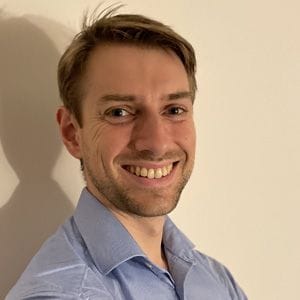In this interview, Dr. Peveler discusses his current work in sensor design, the impact of open access on public and industry engagement, and the evolving role of open science workflows like preprints and transparent peer review.

As part of an ongoing series here on ACS Axial, we’re interviewing authors and librarians from around the world to find out more about their research, their published work, and the impact that open science is having on a changing landscape of research communication. This time, we talked to Dr. William Peveler, Senior Lecturer in the School of Chemistry at the University of Glasgow, United Kingdom.
...OA is key for making sure we get our work out there and being better known for what we do.

What’s your research group’s main focus?
We're a synthetic chemistry group, with a really strong interest in analytical chemistry. We design sensors and diagnostics, and we're currently working on sensors for liver disease, wastewater and natural waters (including measuring pollutants), and for the food and drink industry as well.
The common thread through all of those is that we build our sensors to work like the nose—so we build arrays of sensors and pick up patterns within our analyte, whether that be blood, or water, or whiskey, and then use that to get some information about the sample. We go all the way from making the molecules, through to testing them in the lab, and then implementing them in practice—factories, clinics, and so on.
You’ve published open access articles with ACS many times—how do you find the experience?
We have an open access mandate in the UK, particularly because a lot of the work in our labs is funded by the taxpayer through UKRI or charities, so we are obligated to publish open access.
We have open access agreements with multiple publishers through the University of Glasgow library, which makes publishing OA very easy—I just need to click a button and it all gets taken care of. Before we had these kind of agreements the process was more complex; I'm an ACS member and I got a discount on OA publishing charges through that, but I needed to fill out forms and negotiate with the library to cover the costs. Now it's all streamlined and really easy.
You’ve published OA under your institution’s agreement with ACS Publications—how did you discover this was available?
It was through the act of publishing a paper. I knew about a similar agreement with a different publisher, and the next time I published in an ACS journal the option to publish under our agreement appeared. I was expecting to have to fill out forms again, but the library told me I just needed to opt into OA with a single button, and it was done. It was a similar system to one we'd seen with a different publisher.
What are your thoughts on the concept of open access?
I think it's hugely important because we do a lot of work with industry and the medical profession, and OA means that people can find our work easily. We get better connectivity with the people we want to engage with, because they can just read it without subscription, and they don't have to ask for a PDF and wait for a reply. It means that the end users can actually understand what's going on a little better - so patients, for example, could potentially go back and find the work that's underpinning some of the diagnostics or treatments they're experiencing. Ultimately, because we're taxpayer funded, the public is paying for this work to be done and so I think the public has a right to see what we're doing, and to see how it's being useful further down the line. So OA is key for making sure we get our work out there and being better known for what we do, and also for the public be able to actually see what what's going on with their taxes.
What are your thoughts on open science workflows (e.g. preprints, open data, transparent peer review) more generally?
For open data, our university has a local data archive that we can link our papers to. We're trying to put more of our source data out alongside the articles, and in some cases adding it as supplementary information is fine—but there are certain types of data that are just too large to publish in this way, so we make them available through the University's archive instead. That helps comply with the various funder mandates around open data, and having plans in place that mean the data can be found for at least ten years after publication.
I'm still pretty new to preprinting, but we're using this more. This year I've uploaded to ChemRxiv for the first time, and it's good to see that preprints are being more accepted by publishers rather than being treated as prior publications, which maybe was an issue in the past. Now everyone seems happy that a preprint is its own thing, different to the version of record, and you can link to the final article when it's available. This is definitely something we'll explore more in future.
I've done open peer review a few times. When I review articles it's mostly single blind (so the author doesn't know the reviewers' identities) but some journals are offering double blind review now (where the authors' identities are hidden from the reviewers) which is very interesting, but a lot more complex to get working because you can usually tell when a paper is citing the authors' previous work. Now open peer review is sometimes provided as an option, and you see reviews being published alongside the final article more and more often. It's quite interesting to see those conversations alongside the final paper and how they shape its development; and as a reviewer it makes you think a lot more about what and how you're writing.
What do you think are the biggest recent developments in open science and open access?
I think the big one was cOAlition S and the work around that. It's led to various discussions about how universities and individual researchers work with publishers. Open access isn't a solved problem, but this initiative certainly opened a lot of dialogue, and I think that's probably the biggest thing at the moment. This was coupled with mandates from research funders requiring immediate OA for articles. We also have the Research Excellence Framework (REF) exercise in the UK that requires OA. All of this makes the institutional agreements all the more important, because otherwise all the publishing costs would have to be covered by grants that aren't being increased to match. If a research project leads to multiple publications, I'd need to find the money for APCs from somewhere, which would reduce how much work we could do.
I see the benefits from OA myself; if I'm out and about, on the train, or wherever and I find a paper I want to read quickly, then with OA I can just click into it and read, with no drama. If it's not OA then you need to log into your university account, go through all the authentication steps…if I have to do that, I'll probably just tell myself I'll do it later, when I'm back in my office and then I often forget about it, and might miss something important.
Where do you see OA in 10 years' time?
Hopefully it'll be universal. I'm not well versed enough in the economics and politics to know quite how that would pan out, and how it could be made to work for everyone, but I would hope that it would just be the norm, depending on the models that that fall into place. I don't think OA is going away—the pressure from the funders to make sure that work is shared in a in a fair and equitable way is very strong, so I think it will keep growing.
What do you think you'd be doing if you weren't a researcher?
It's very hard to say because I love generating ideas, designing and creating things. I guess I make a lot of music, in fact it's what I spend a lot of my spare time doing, playing in various ensembles, but I don't think I would be a professional musician, because I'm not that good!
I think it always has to be something creative though, whether that's music, or cooking or something else—because a lot of the engineering and the science that we do, it's all creative.
